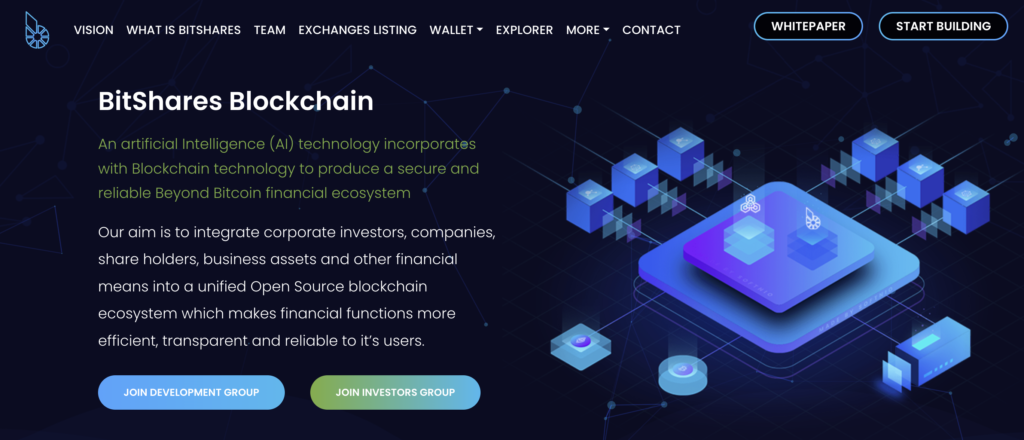This article will delve into the BitShares project and its native cryptocurrency, BTS. We will explore the comprehensive aspects of BitShares, including its unique technological framework, the intricacies of its tokenomics, and the vibrant ecosystem that supports it. Additionally, we will evaluate the potential growth prospects and provide a development forecast based on current market trends and expert analysis. Our aim is to furnish a detailed and insightful examination of BitShares for both seasoned crypto enthusiasts and newcomers looking to understand this innovative platform.

What is BitShares?
BitShares is a decentralized platform that leverages blockchain technology to offer a suite of financial services and products. At its core, BitShares operates a decentralized exchange (DEX) that facilitates peer-to-peer trading of cryptocurrencies and other digital assets. The platform is designed to provide high-speed, secure, and low-cost transactions, effectively addressing the limitations of traditional financial systems. BitShares aims to offer a more transparent, efficient, and inclusive financial ecosystem by eliminating intermediaries, reducing transaction fees, and ensuring real-time settlement. One of its key features is the ability to issue and trade market-pegged assets, also known as BitAssets, which are designed to maintain stable value by being tied to real-world assets like the US dollar.
History of BitShares
BitShares was founded in 2013 and officially launched in October 2015. The project was driven by the vision of creating an industrial-grade decentralized platform capable of processing high-performance financial transactions. One of the earliest milestones in BitShares’ development was the introduction of its Delegated Proof of Stake (DPoS) consensus mechanism, which enhanced the network’s scalability and security. Over the years, BitShares has undergone several upgrades to improve its functionality and user experience. Significant milestones include the integration of smart contracts, the launch of a decentralized prediction market, and the implementation of liquidity pools and automated market makers (AMMs). Throughout its history, BitShares has continuously evolved to meet the growing demands of the decentralized finance (DeFi) landscape, cementing its position as a pioneering force in the blockchain industry.
How BitShares Works
BitShares operates on a highly efficient and secure decentralized platform that utilizes several advanced blockchain technologies to deliver its services. Central to BitShares’ functionality is its Delegated Proof of Stake (DPoS) consensus mechanism, which ensures high transaction throughput, security, and energy efficiency.
Delegated Proof of Stake (DPoS)
The DPoS consensus mechanism is a standout feature of BitShares. Unlike Proof of Work (PoW) systems that require substantial computational power, DPoS relies on a reputation-based voting system. In this system, BTS token holders vote for a small number of delegates (also known as witnesses) who are responsible for validating transactions and maintaining the blockchain. This approach significantly reduces the time and resources needed to reach consensus, enabling BitShares to process up to 100,000 transactions per second.
Blockchain Structure
The BitShares blockchain is designed to support a wide range of decentralized financial services. It leverages a modular architecture that allows for scalability and flexibility. Each module serves a specific function, such as asset issuance, trading, and market pegging. The blockchain records incremental changes, or operations, which are validated and then applied to update the current state of the ledger. This ensures the system’s transparency and immutability.
Unique Features
Decentralized Exchange (DEX)
BitShares’ DEX is a core component that differentiates it from other blockchain projects. It enables users to trade cryptocurrencies and other digital assets directly with each other without the need for intermediaries. The DEX supports various order types and offers features such as margin trading and short selling.
Market-Pegged Assets (MPAs)
Another distinctive feature is the issuance of Market-Pegged Assets, or BitAssets. These assets are designed to maintain a stable value by being pegged to real-world assets like the US dollar. This provides users with the benefits of cryptocurrency—such as fast and secure transactions—while mitigating the volatility typically associated with digital currencies.
Technical Details
BitShares employs Graphene, an open-source blockchain implementation, which underpins its high performance. Graphene’s use of parallel processing and optimized memory management allows BitShares to achieve its impressive transaction speeds. The platform also incorporates advanced cryptographic techniques to ensure data integrity and security.
The governance model of BitShares is another technical highlight. It includes a built-in decentralized voting system where BTS holders can vote on proposals for network upgrades, budget allocations, and other critical decisions. This democratic approach ensures that the development and operation of the network align with the interests of its community.
Tokenomics of BitShares
BitShares employs its native cryptocurrency, BTS, which functions as a utility token within the ecosystem. As a token, BTS is pivotal for various operations on the BitShares platform, from paying transaction fees to participating in the governance system.
Token vs. Coin: Understanding BTS
BTS is classified as a token rather than a coin. This distinction arises because BTS is built on the BitShares blockchain, which is a specific application platform rather than a standalone blockchain like Bitcoin or Ethereum. Tokens typically operate within an existing blockchain framework, providing functionalities specific to that ecosystem, as opposed to coins which represent a form of digital currency used for transactions across multiple platforms.
Emission Model and Supply
BitShares employs a dynamic supply model for BTS. Initially, 2,412,042,197 BTS were distributed during the genesis block, with a maximum supply capped at 3,600,570,502 BTS. The difference between the circulating and maximum supply is reserved for network development, maintenance, and rewarding block producers. This reserve system ensures that the BitShares network can continually incentivize contributors and sustain long-term development.
The emission model is carefully structured to balance the need for incentivizing participants while preventing excessive inflation. The additional tokens in reserve can only be accessed through a community voting process, ensuring transparent and democratic allocation of resources.
BTS Utility and Use Cases
BTS serves multiple critical functions within the BitShares ecosystem:
- Transaction Fees: BTS is used to pay for transaction fees on the BitShares network. This includes transfers, trading on the DEX, and executing smart contracts.
- Governance: BTS holders can vote on various proposals that impact the future development and operation of the network. This includes electing witnesses, committee members, and approving worker proposals for funding.
- Staking and Rewards: While BitShares does not offer traditional staking rewards, holders can delegate their BTS to witnesses, who in turn secure the network and receive compensation from transaction fees.
Market Performance and Price Dynamics
The price of BTS has experienced significant fluctuations since its inception, influenced by market conditions, technological developments, and broader trends within the cryptocurrency space. As of recent data, BTS trades at a fraction of its historical highs, reflecting both the challenges and potential within the decentralized finance sector.
Market factors affecting BTS’s price include:
- Adoption of BitShares DEX: Increased usage and liquidity on the decentralized exchange can positively impact BTS demand and price.
- Technological Upgrades: Implementation of new features and enhancements can drive investor interest and valuation.
- Market Sentiment: Broader cryptocurrency market trends, regulatory developments, and economic conditions play a significant role in price dynamics.
In summary, BTS is a multifaceted utility token integral to the functioning and governance of the BitShares platform. Its tokenomics are designed to support a sustainable and democratic ecosystem, balancing incentives with prudent supply management. The performance and future potential of BTS remain closely tied to the ongoing development and adoption of the BitShares network.
Where to Buy BitShares (BTS)
BitShares (BTS) is available for trading on several major cryptocurrency exchanges. Below is a list of some of the most prominent platforms where you can purchase BTS:
Exchanges
- HTX is a well-established exchange known for its robust security measures and extensive range of supported cryptocurrencies. It provides various trading pairs and options for purchasing BTS.
- MEXC is a global cryptocurrency exchange offering a comprehensive range of digital assets. It supports BTS trading and provides a user-friendly interface for both beginners and experienced traders.
- Gate.io is a leading derivatives exchange that has recently expanded its offerings to include spot trading. It is known for its advanced trading features and security protocols.
Where to Store BitShares (BTS)
Storing your BTS securely is crucial. There are several wallets available that support BTS, each offering different features to suit your needs. Here are some recommended options:
Wallets
- The official BitShares wallet is designed specifically for BTS and offers seamless integration with the BitShares blockchain. It provides features such as staking, voting, and asset management.
- Ledger is a hardware wallet known for its high-security standards. It supports BTS and allows you to store your tokens offline, protecting them from online threats.
- Another leading hardware wallet, Trezor, supports BTS and provides robust security features, including two-factor authentication and encrypted storage.
- Trust Wallet is a mobile wallet that supports a wide range of cryptocurrencies, including BTS. It offers a user-friendly interface, in-app trading, and strong security features.
- Exodus is a desktop and mobile wallet known for its intuitive design and comprehensive support for multiple cryptocurrencies, including BTS. It also offers portfolio tracking and built-in exchange services.
Purchasing BTS is straightforward with its availability on major exchanges like HTX, MEXC, and Gate.io. For secure storage, options range from official and mobile wallets to highly secure hardware wallets such as Ledger and Trezor. Each wallet provides unique features to ensure the safety and accessibility of your BTS holdings.
Project Growth Prospects
The growth of BitShares is anchored in its unique technological offerings and the robust functionality of its decentralized exchange (DEX). The platform’s ability to process high volumes of transactions swiftly and securely positions it as a significant player in the decentralized finance (DeFi) sector.
Factors Driving Growth
- Advanced Technology: BitShares leverages the Delegated Proof of Stake (DPoS) consensus mechanism, which ensures efficient and scalable transaction processing. This technological advantage is critical for maintaining high performance and attracting users.
- Financial Inclusion: By eliminating intermediaries and reducing transaction costs, BitShares aims to democratize access to financial services, appealing to a global user base seeking secure and low-cost trading solutions.
- Market-Pegged Assets: The ability to issue market-pegged assets, such as stablecoins pegged to fiat currencies, provides a stable trading environment and attracts users looking for less volatile investment options.
Clients and Partners
BitShares serves a diverse clientele ranging from individual traders to institutional investors. The platform’s flexibility and range of financial instruments make it attractive to various user groups.
Key Partners:
- OpenLedger: A blockchain solutions provider that integrates with BitShares to offer advanced financial services.
- RuDEX: A gateway for BitShares assets, enhancing liquidity and trading options.
Project Ecosystem
BitShares boasts a comprehensive and dynamic ecosystem that includes a variety of decentralized applications (dApps) and financial services. This ecosystem supports and enhances the platform’s core functionalities, providing users with a broad range of tools and services.
Ecosystem Components
- Decentralized Exchange (DEX): The core of the BitShares ecosystem, the DEX facilitates secure, peer-to-peer trading of cryptocurrencies and other digital assets without intermediaries.
- SmartCoins: These are digital assets pegged to real-world currencies, providing stability and reducing exposure to market volatility.
- Prediction Markets: BitShares includes decentralized prediction markets that allow users to speculate on the outcome of events, adding a unique financial instrument to the ecosystem.
- Liquidity Pools and Automated Market Makers (AMMs): These features provide enhanced liquidity and efficient trading mechanisms, ensuring smoother transactions and better price discovery.
Growth Forecast
The future development of BitShares looks promising due to ongoing technological enhancements and strategic partnerships. Key factors influencing its growth include:
- Technological Upgrades: Continuous improvements to the platform’s infrastructure will enhance scalability and performance.
- Regulatory Developments: Positive regulatory frameworks could facilitate wider adoption and integration into traditional financial systems.
- Market Adoption: Increased usage of BitShares’ financial instruments, like SmartCoins and the DEX, will drive growth and user retention.
BitShares is well-positioned to capitalize on the expanding DeFi market, and its innovative technology and comprehensive ecosystem will likely sustain its growth trajectory.
Conclusion
In summary, the BitShares project represents a significant player in the decentralized exchange space with its unique features and technological advancements. Its commitment to providing a robust, scalable, and efficient platform for cryptocurrency trading and financial services is notable. While the future of BTS remains subject to market dynamics and technological developments, the foundation and vision of BitShares offer a promising outlook for those invested in its potential.






